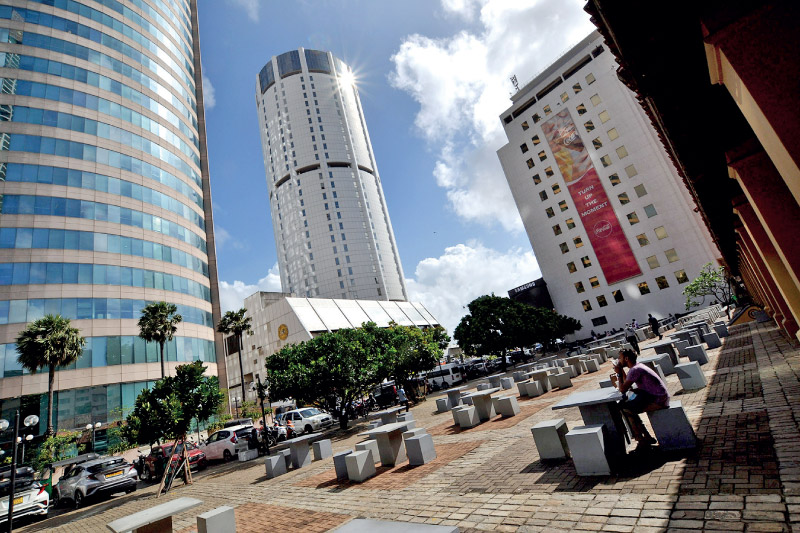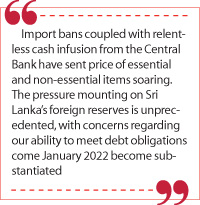Saturday Feb 14, 2026
Saturday Feb 14, 2026
Friday, 10 September 2021 00:11 - - {{hitsCtrl.values.hits}}

The Sri Lankan economy and its people are deep in crisis, plagued by the unceasing pandemic with questions raised over its handling – Pic by Shehan Gunasekara
By Kumar Ranaweera
To term the Government’s Appropriation Bill for 2022 the most anticipated and decisive presentation since the end of Sri Lanka’s civil war is far from fallacy. The Sri Lankan economy and its people are deep in crisis, plagued by the unceasing pandemic with questions raised over its handling. Whilst we indulge some ingenuous introspection over the incapacity to escape this vicious cycle, let us consider some quick fixes for the immediate concerns regarding our economy.
Earlier, Trade Minister Bandula Gunawardena said Government earnings during 2020 was Rs. 1,343 billion versus expenditure of Rs. 2,548 billion the same year. This leaves a shortfall of Rs. 1,205 billion to make up. Furthermore, the Institute of Policy Studies (IPS) says Government must spend up to Rs. 66 billion more in 2021 to procure vaccines against COVID-19, which was not included in the National Budget for the year.
Import bans coupled with relentless cash infusion from the Central Bank have sent price of essential and non-essential items soaring. The pressure mounting on Sri Lanka’s foreign reserves is unprecedented, with concerns regarding our ability to meet debt obligations come January 2022 become substantiated.
As projected by CITI last month, “with the 2022 Budget under preparation, which will likely be an important policy document to reach some agreement with the IMF, we think austerity measures now look inevitable”.
 Open for imports
Open for imports
What can we do? In the first place, the Government must reconsider its ban on imports on commodity items and let market forces determine price.
The ban on import of turmeric is laughable. Sri Lanka spends just $ 7 million annually on imports, and restrictions have seen prices rise tenfold for this most basic commodity heaping needless burden on the public. Furthermore, 40% of imports into Sri Lanka are intermediate goods, and restrictions have disrupted supply chains that could offer greater export revenue to the country.
Sri Lanka must exercise caution with such controls so it does not trigger tariff wars with its global trading partners, and the negative media generated is quite telling.
Imports of luxury items, including cars, could be allowed under a stringent band of tax, whereby importers and consumers must pay hefty premiums to obtain these goods. In this manner Government could enhance revenue, whilst also providing room for consumers who can afford it to receive products and services of their choice.
A calculated import regime will lead to greater earnings, product quality, affordability and availability, enhanced revenue, value-added exports, better trade relations and market-driven price with minimum intervention by Government.
Fertiliser to grow
The ban on chemical fertiliser needs to be done away with immediately. The plan to switch to fully organic manure is noble, but it will destroy yields and our viability of our produce.
Since the ’60s, Sri Lanka has employed seed varieties that focus on enhanced yields, and has primed soil and plants to feed entirely on chemical fertilisers. This is how we went from 45 bushels per acre to 100 with paddy. Natural compost cannot compensate for the nutrient loss after each harvest. It would take years for soil and plants to achieve viability with natural compost alone, and the process must be repeated. Instead, we require a well-detailed plan to identify and promote application of mixed fertilisers and do away with toxic pesticides that harm flora and fauna.
Critically, the Government must remove all subsidies on fertiliser and once again let the market determine prices. The lack of subsidies will also prompt farmers to be measured in their approach to fertiliser usage, and be compelled to mix traditional environmentally-friendly practices. The Government will save over Rs. 6 billion annually by doing away with subsidies.
 Let’s pay PAYE
Let’s pay PAYE
Bring back the PAYE tax. The abolition of PAYE tax was unsound action that significantly impaired Government revenue. It was a purely political manoeuvre that was uncalled for nor anticipated by the tax-paying public. Having realised its folly, the Government in April 2020 proceeded to reintroduce the scheme as an Advanced Personal Income Tax that can be deducted upon employee consent, but this scheme brought little success.
Acutely conservative estimates based on the Sri Lanka Labour Force Survey 2020 of the Department of Census and Statistics point to the government losing Rs. 150 billion annually with the abolition of this tax. The Government should immediately reintroduce this tax and reinstate what was a pillar of unfettered revenue.
Method in madness
Tax on cigarettes and alcohol have been a mainstay of the Treasury for decades, and will continue so under a regime of pragmatic pricing. The alcohol and tobacco industry in Sri Lanka contribute over Rs. 200 billion and Rs. 120 billion respectively in taxes annually, that’s close to 20% of total Government earnings in 2020.
For a layman, it may then seem opportune to increase tax and quite simply enhance earnings. But what is not so apparent is declining volumes in both legal tobacco and alcohol sales in the face of a burgeoning illicit market. Up to 80% of alcohol consumed in Sri Lanka is illicit, as per the WHO, and lockdowns have already impaired Government earnings from this sector.
The country’s cigarette industry also reports loss in market share down to 25% due to price pressure and prevalence of cheaper illicit products alongside domestically produced beedis that evade the tax net.
Cigarettes in Sri Lanka are the most expensive in world as per data published by the World Health Organization in its 2021 Global Tobacco Epidemic report and this is reflected in dwindling smoking incidence, which is reportedly lower than 15% down from 25% just five years ago, as per Dr. Palitha Abeykoon speaking at a recent meeting of the Sri Lanka Medical Association. Revenue contribution to the State has remained flat due to price pressures, financial reports state.
An IPS report projects Government revenue could increase a further Rs. 37 billion by 2023 if cigarette pricing is streamlined according to inflation. However, in a nation already sporting the most expensive cigarettes in the world, further price increases are likely to prove counterproductive and erode Government revenue.
The State sector quagmire
In his explanation, Minister Gunawardena went on to state that Rs. 1,052 billion was spent that year on salaries and pensions for the State sector.
Recurrent expenditure of the State has been a bone of contention for the past 30 years, with successive governments paying lip service to the need for restructuring and reforming the State sector due to its excess. Notwithstanding these statements, every regime has gone about enrolling more supporters to the public fold keeping to and securing their political promises.
Once again, this Government and its officials have pointed to the burden heaped on the exchequer by the burgeoned sector during this time of acute crisis.
However, the President is quoted in June this year stating that 65,000 unemployed graduates were hired into the State sector over the past year, and a further 35,000 more into a new department. “Employment opportunities for unemployed graduates were one of the main demands made to us during the election,” the President is quoted saying.
What tasks are these 65,000 graduates engaged in that were not addressed all these years? What new revenue streams have government opened up to pay salaries for these 100,000 new jobs it created in the State sector. Is this one more reason the Central Bank must infuse liquidity, or print money, so frequently? Why are we not learning from our constant string of grave mistakes?
State sector reforms have been mulled for long and supported by development agencies and local and foreign think tanks. But they never see fruition as it upsets the political ambitions of all and sundry. As alluded to above, Sri Lankans must indulge in some ingenuous introspection over its incapacity to escape this vicious cycle of politics and gloom.
(An undergraduate of the University of Colombo, the writer also serves as Research Assistant at a leading audit firm in Sri Lanka.)